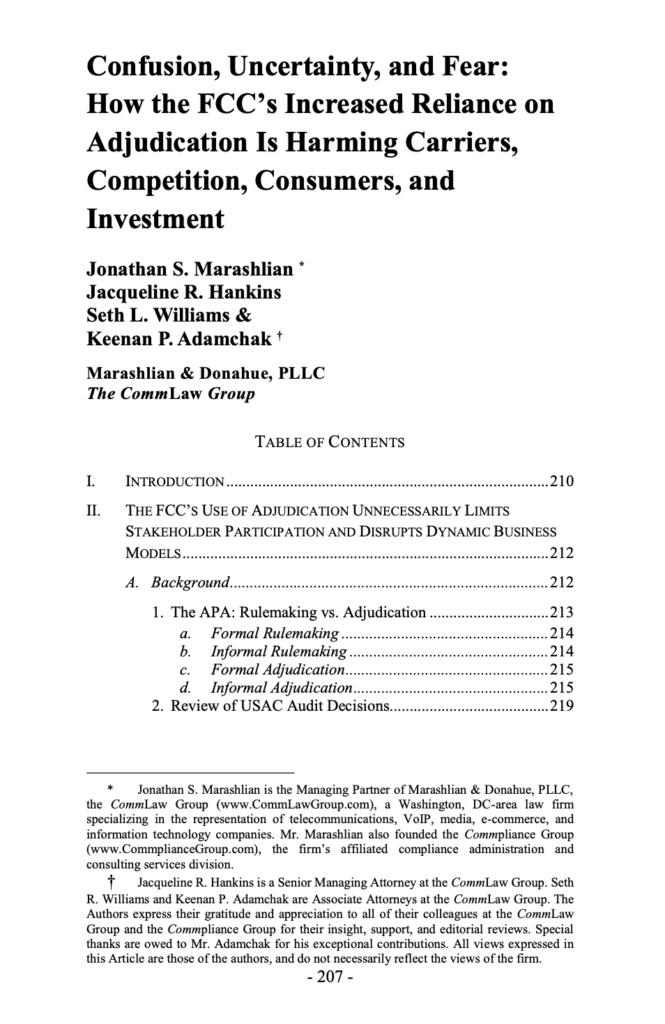All Attorneys
*Scroll to view more
- About Us
-
Telecom Market Sectors
-
Practice Areas
-
Attorneys
- Compliance Resources
- Insights and Advisories
- Contact
Home / Telecom Compliance Resources / Confusion, Uncertainty, And Fear: How The FCC’s Increased Reliance On Adjudication Is Harming Carriers, Competition, Consumers, And Investment

The FCC has increasingly relied upon the informal adjudicatory process to craft industry-wide regulatory policy (arguably creating new regulations in the process).
By legislating through informal adjudication, the FCC has created a litany of challenges for the telecommunications industry, including increased uncertainty, fear, and a slew of competitive harms caused by inconsistent and shifting regulatory positions adopted in ad hoc adjudications. In addition, the courts – which should otherwise operate as a “check” on the scope of the FCC’s authority – have increasingly become ineffective by dismissing appeals of agency adjudicatory decisions having industry-wide impact on standing and procedural grounds.
This has effectively given the FCC unbridled authority to utilize the informal adjudicatory process in a manner that leaves many regulated entities with little opportunity to participate in the process.
The FCC’s reliance on adjudications to move the regulatory goalposts is readily apparent in the context of the Commission’s jurisprudence governing Universal Service Fund contributions.
This Article explores the phenomenon by tracing the slow, but steady erosion of the “contamination theory” from the Computer II decision, to Pulver.com, Brand-X, InterCall, WebEx, and beyond.
Recognizing the broad discretion enjoyed by the FCC in deciding whether to develop USF contribution policies via rulemaking or adjudication, this Article culminates in the conclusion that the industry and the consumers it serves would greatly benefit from reforming the FCC’s current predisposition in favor of rulemaking via informal adjudication.
Whether through increased judicial oversight or the implementation of new policymaking procedures, change is long overdue. A shift back to rulemaking or, minimally, opening the Courtroom doors to a larger swath of aggrieved parties, would serve the public interest by promoting transparency, predictability, and participation in the regulatory process. (Citation: Federal Communications Law Journal, Volume 68, Issue 2, August 2016)
Our niche is the industry sectors we primarily serve, not the law we practice. We are a one-stop law firm ready to meet the comprehensive legal needs of digital economy companies!
Businesses often come to us to help solve specific challenges or capitalize on opportunities because of our specialization and expertise. But once a client experiences “The CommLaw Way,” they stay!
Our clients depend on us to fulfill a larger and more diverse array of their legal needs because they trust us and appreciate our way of delivering Big Law expertise, but without the Big Law inefficiencies, excesses, and impersonal client service.
We redefine the delivery of legal services to meet the expectations of modern clients. With a practical and pragmatic approach, we prioritize efficiency and employ business processes that ensure the right professionals handle the right tasks at the right price.
Our commitment to transparency and predictability shines through our billing practices. Harnessing emerging technologies, including artificial intelligence, we augment and enhance the expert services provided by our exceptional legal professionals.
With a team of talented, knowledgeable, and personable individuals, we strive to deliver unparalleled legal solutions tailored to your specific needs.
Copyright 2023 Marashlian & Donahue, PLLC | Disclaimers | Privacy Policy | Terms and Conditions

DISCLAIMER: By subscribing to our firm’s newsletter, you acknowledge that you have read and understand the disclaimers posted to our site.